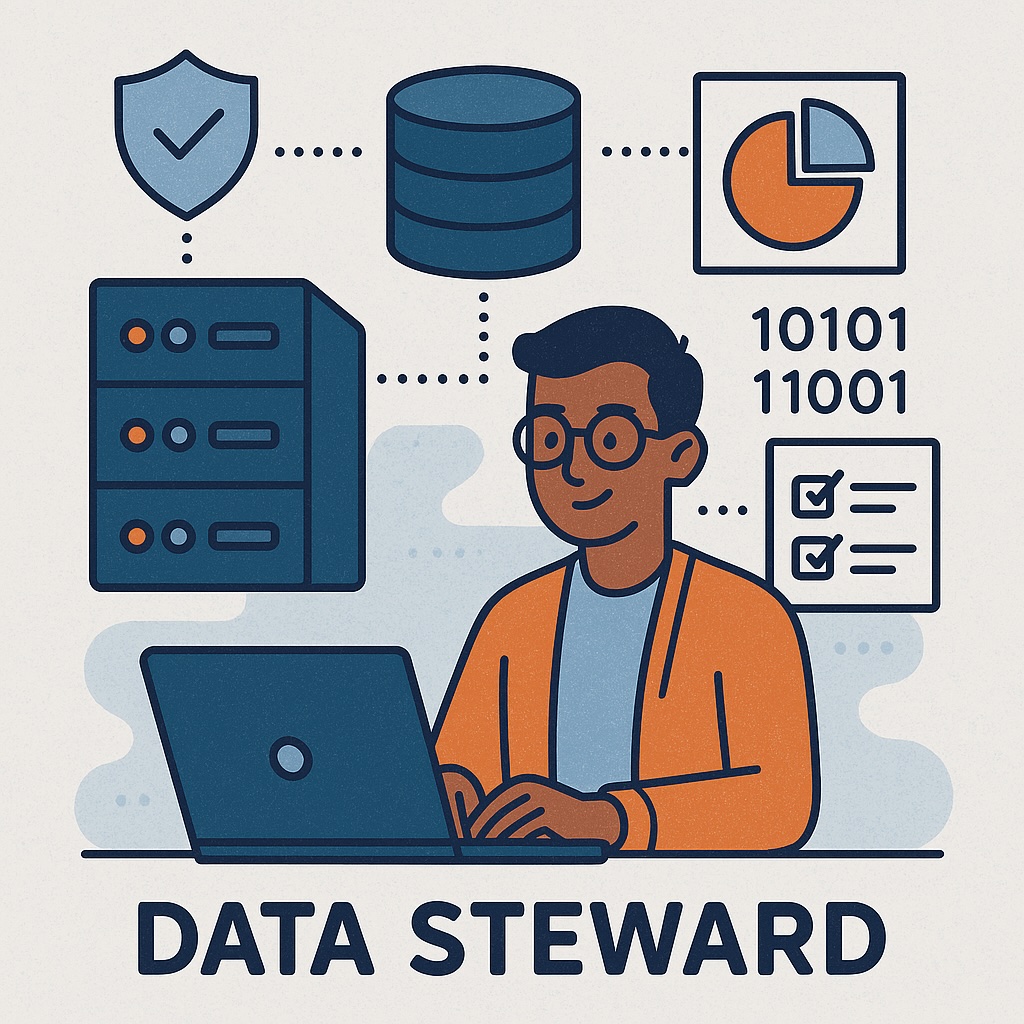What does a Data Steward do
Data stewards play a crucial role in ensuring the quality and integrity of data within an organization. They are responsible for structuring, managing, and securing data, making it not only easily accessible but also reliable and usable for professionals such as data analysts and data scientists.
Responsibilities of a Data Steward
The primary responsibility of a data steward is managing data quality within the organization. This means ensuring that data is stored in a structured and consistent manner. By doing this carefully, other employees can quickly and easily find and use the data for their specific tasks. A data steward must ensure the accuracy, completeness, and reliability of data by regularly performing checks and updates.
Knowledge and Skills
A data steward must have in-depth knowledge of various data sources, data management tools, data standards, and the laws and regulations surrounding data. This also includes the correct procedures for managing sensitive information, such as personal data, and complying with privacy laws such as the GDPR. Knowledge of data sources ensures that the data steward can ensure seamless integration of data from different systems within the organization.
The Important Role in Data Governance
In the modern data-driven organization, the role of the data steward has become increasingly important. Data stewards are often involved in developing and implementing policies and processes around data governance. This means ensuring that data is managed in a responsible and secure way so that the organization can meet both internal and external requirements regarding data integrity and compliance. Managing data is not just a technical task, but also has a strategic aspect, as good data governance lays the foundation for making informed business decisions.
Communication and Collaboration
Data stewards must have excellent communication skills, as they often collaborate with various departments and stakeholders. This can range from IT teams responsible for the technical infrastructure to legal and compliance departments overseeing adherence to laws and regulations. The ability to communicate effectively is essential for solving data issues and promoting best practices in data management.
The Future of the Data Steward
As businesses become increasingly reliant on data analysis for strategic decision-making, the role of the data steward will only continue to grow in importance. Data stewards will not only be responsible for managing data but also for supporting the organization in achieving data-driven objectives. The demand for well-trained and skilled data stewards is expected to continue to rise as the value of data and the need to manage it effectively grows.

Job Profile of a Data Steward
A typical job profile of a data steward:
Education and Knowledge
- Someone with a relevant bachelor’s or academic degree in data management, computer science, data science, or a related field. A master's degree or specific certifications in data management is often desired.
Skills in Data Management
- Strong in organizing, managing, and monitoring the quality of data, with a keen eye for detail and accuracy. The ability to structure large amounts of complex data and ensure it is consistent and reliable is essential.
- Experience with data management tools and technologies such as SQL, data warehouses, data lakes, and modern ETL processes. In-depth knowledge of BI tools and data integration platforms is often required.
Compliance and Legislation
- In-depth knowledge of data governance, data quality, data privacy legislation (such as the GDPR), and best practices for data security. The data steward ensures that data is managed according to applicable laws and regulations and internal company guidelines.
- Familiarity with developing data stewardship policies, including guidelines for data privacy, ethical use of data, and ensuring data security.
Communication and Collaboration
- Excellent communication skills and the ability to effectively collaborate with various teams, including IT, business, compliance, and other departments. The data steward often acts as a liaison between technical and non-technical stakeholders.
- The ability to communicate data insights in an understandable way, both to technical teams and management, to support informed decision-making.
Strategic Use of Data
- Insight into business processes, domain-specific knowledge, and the ability to strategically use data to support business objectives. This includes identifying opportunities for data analysis that can contribute to operational efficiency, customer insights, and achieving strategic goals.
- The ability to drive data-driven decisions by providing the right datasets to the right teams and ensuring that data is used optimally.
Tools and Technologies
- Experience with tools and technologies such as data visualization platforms (e.g., Tableau, Power BI), data integration platforms (e.g., Talend, Apache Nifi), and cloud solutions (e.g., AWS, Azure) is a plus. The data steward must be able to use these tools to manage data flows and create insightful reports.

Which tools does a Data Steward use
Data Governance Tools
Data governance tools assist Data Stewards in managing and enforcing policies, procedures, and data standards. These tools play a crucial role in ensuring data quality, compliance, and transparency within organizations. Modern tools offer comprehensive functionalities such as metadata management, data lineage, data cataloging, compliance monitoring, and business glossaries. Many of these tools utilize advanced technologies such as artificial intelligence (AI) and machine learning, enabling automatic generation of data labels, analysis of data flows, and detection of anomalies.
Increasingly, data governance tools also offer advanced integrations with other data management platforms and automated workflows, improving the efficiency of data operations. This makes managing large amounts of data simpler and less error-prone. Some well-known examples of data governance tools include Collibra, Alation, Informatica Axon, and Atlan.
Data Quality Tools
Ensuring data quality is essential for organizations that want to use reliable and actionable data for analysis and decision-making. Data quality tools assist in validating, deduplicating, enriching, standardizing, and monitoring data. Modern tools provide real-time data profiling and automatic error detection, using machine learning to recognize patterns and predict data quality issues before they occur.
These tools can also automate processes for data cleaning and transformation, enhancing efficiency and accuracy. Additionally, AI is increasingly being used to improve data quality, such as automatically filling in missing data or identifying anomalies in datasets. Popular examples of tools include Informatica Data Quality, Talend Data Quality, Ataccama ONE, and Precisely Trillium.
Data Security Tools
In an era where data protection and privacy regulations, such as GDPR, are becoming stricter, data security tools are essential for safeguarding sensitive information. These tools help manage access control, data masking, encryption, and monitoring of data usage. Additionally, they offer robust functionalities for compliance reporting and conducting risk assessments to protect the organization against data breaches and security incidents.
Modern security tools increasingly utilize AI and machine learning to detect threats in real-time and automatically respond to suspicious activities. This significantly enhances the speed and effectiveness of security measures. Well-known examples of data security tools include IBM Security Guardium, Imperva Data Security, Microsoft Purview, and Protegrity.
Data Integration Tools
Data integration tools are critical for efficiently gathering, transforming, and combining data from diverse sources, both on-premises and in the cloud. They enable organizations to seamlessly merge data from different systems and platforms, improving the accessibility and usability of the data. Many of these tools now support real-time data integration, API connections, and data orchestration, enabling data to be processed and transferred quickly and efficiently.
In recent years, significant advancements have been made in data integration automation, including self-service integration platforms and enhanced transformation capabilities. AI is increasingly being used to automatically perform data cleaning and transformations, significantly speeding up integration. Popular data integration tools include Talend Cloud Data Integration, Informatica Intelligent Data Management Cloud (IDMC), Fivetran, and Apache NiFi.
Master Data Management Tools
Master Data Management (MDM) tools are designed to provide a consistent and reliable source of truth for critical business entities such as customers, products, and suppliers. They help organizations maintain data consistency, data quality, and governance across departments and systems, which is essential for efficient and reliable operations.
Cloud-native MDM solutions are becoming increasingly popular due to their scalability, flexibility, and lower costs. These tools can now also leverage advanced AI functionalities to support data enrichment and data quality improvement. This allows organizations to manage and improve their master data more efficiently. Well-known MDM tools include Informatica MDM, SAP Master Data Governance, Stibo Systems, and Reltio.
Data Visualization Tools
Data visualization tools help Data Stewards and other stakeholders to effectively present insights and understand complex data patterns. These tools are increasingly equipped with AI functionalities such as automatic insight discovery and predictive analytics, enabling users to make faster and more accurate decisions.
Nowadays, these tools are often integrated with other data management systems, providing a seamless experience and better data visualization. Additionally, AI now allows for the enhancement of visual data analysis methods, such as automatically creating charts and diagrams that reveal key trends and insights. Popular data visualization tools include Tableau, Microsoft Power BI, Looker (Google Cloud), and Qlik Sense.

The Role of Data Steward in Data Governance and Compliance
The role of Data Steward is crucial within the domain of data governance and compliance. This role focuses on managing, organizing, and overseeing the quality of data within an organization. A Data Steward is responsible for ensuring the integrity, consistency, and usability of data used across various departments. They act as the 'guardian' of the data, ensuring that it adheres to internal guidelines, external regulations, and compliance requirements, while working closely with other stakeholders such as data engineers, data analysts, and business units.
Within data governance and compliance, the Data Steward often serves as the bridge between the technical side of data architecture and the business needs of the organization. The Data Steward ensures that data is not only collected and stored properly, but also correctly categorized and managed to make the most of it, while simultaneously meeting necessary legal and regulatory requirements.
Relationship with Other Roles within Data Governance and Compliance
Data Stewards work closely with several other key roles within the domain of data governance and compliance. Some of these roles include:
- Data Governance Manager: This individual is responsible for establishing and implementing the data governance policy within the organization. The Data Steward supports the Data Governance Manager by ensuring that the policy is followed and applied to daily data practices, with special attention to compliance requirements such as the General Data Protection Regulation (GDPR) or other relevant legislation.
- Compliance Officer: The Compliance Officer ensures that the organization complies with all external laws and regulations, including data protection laws and other data-related rules. Data Stewards work closely with the Compliance Officer to ensure that data is properly managed and protected in accordance with applicable standards and requirements.
- Data Architect: The Data Architect designs the systems and structures in which data is stored and managed. Data Stewards ensure that the data within these systems is properly organized, remains consistent, and complies with requirements such as data security and privacy.
- Data Owner: This person is responsible for the business value of the data and the decisions made based on that data. Data Stewards work with Data Owners to ensure that the data they manage is not only of high quality but also meets compliance standards such as data security and privacy protection.
- Data Analyst: Data Analysts use the data for reporting and analysis. Data Stewards ensure that the data used by Data Analysts is of high quality, well-categorized, and easily accessible for analysis, while complying with requirements for safely handling sensitive information.
Together, these roles form an effective team that ensures data is managed responsibly, securely, and in compliance with legal standards. The Data Steward plays a connecting role, bridging the technical and business aspects of both data governance and compliance. By maintaining the integrity, accessibility, and security of data, the Data Steward not only helps improve organizational efficiency but also minimizes the risk of legal and regulatory issues.

Which personal qualities are suitable for the role of Data Steward
Attention to Detail
Data Stewards must focus on the accuracy, consistency, and reliability of data. They need to have an eye for detail to identify and resolve inaccuracies and inconsistencies in data, but also to recognize trends and patterns that could impact data quality. This is crucial for improving overall data management processes within the organization.
Analytical Thinking
The ability to analyze complex data, identify patterns, trends, or anomalies, is essential. Data Stewards must not only be able to interpret data but also translate insights into strategic actions that support business goals. This helps improve decision-making and optimize the organization's data strategy.
Communication Skills
Data Stewards must be able to communicate complex technical information and data insights effectively to different stakeholders. This includes both technical teams and non-technical stakeholders, where it is important to convey the message clearly and understandably without losing the technical details. Good communication supports collaboration and helps achieve data governance goals.
Problem-Solving Skills
The ability to quickly and effectively identify and solve problems is essential. Data Stewards must be able to address challenges in data quality, data integrity, and data governance. This can range from addressing data misallocation to implementing improvements in the data flows within the organization.
Organizational Skills
Managing data requires a high level of organization and process management. Data Stewards must be able to work with complex data management systems and processes, while also effectively managing multiple tasks and projects. The ability to set priorities and meet deadlines is crucial in a dynamic work environment.
Ethics and Integrity
Given the sensitive and often personal nature of data, it is crucial that Data Stewards follow a strong ethical code. They must commit to protecting privacy and security, and always ensure that data is managed in an ethical and legal manner. Maintaining trust within the organization and with external stakeholders is essential for the success of the data management process.
Teamwork and Collaboration
Data management is often a shared responsibility within the organization. The ability to collaborate effectively with various teams, such as IT, business analysts, managers, and executives, is of great importance. Data Stewards must be able to understand the interests of different stakeholders and support them in implementing data-related processes and policies.

A Day in the Life of a Data Steward
The Role of a Data Steward: The Guardian of Data in the Organization
A Data Steward is more than just a data analyst or data manager. This role is vital for organizations that want to maximize the value of their data while also complying with increasingly stringent regulations around data management. The Data Steward ensures that data is effectively managed, that the quality of the data is maintained, and that data is processed responsibly and securely. In a world where data increasingly forms the basis for strategic decision-making, the Data Steward is the person who ensures everything is in order, from the content to the access and use of this data.
08:00 - 09:30: The Day Begins with Data Quality Control
A Data Steward's day often begins with checking data quality. This is an important part of the role because data is often spread across different systems and may show inconsistencies. A Data Steward analyzes the data for errors, empty fields, duplicates, and other issues that could affect the quality of the data. With the help of advanced data management and data cleaning tools, these inconsistencies can be quickly identified and corrected, making the data reliable and usable for the business.
In addition to checking the quality of the data, a Data Steward is also responsible for identifying new data sources that could contribute to the organization. These could be internal data, but also external data sources that could provide valuable insights. Linking these new sources with existing data can greatly increase the value of the data and ensures the business can make well-informed decisions.
09:30 - 11:00: Collaboration with Data Teams and Business Teams
Mid-morning is time for collaboration. The Data Steward works closely with other data professionals, such as Data Engineers and Data Analysts, as well as non-technical business teams. Communication between technical and business teams is essential to ensure that the value of data is fully understood and leveraged. This means the Data Steward must not only have in-depth technical knowledge but also be able to explain complex technical jargon in an understandable way to non-technical stakeholders.
An important aspect of this collaboration is integrating data from different sources. The Data Steward helps map out the data sources that need to be combined and ensures the integration goes smoothly. This may mean new tools or processes need to be implemented to seamlessly merge the data.
11:00 - 12:30: Managing Data Documentation and Catalogs
Late morning is often focused on updating and maintaining data documentation and data catalogs. A well-maintained data catalog is essential for managing data within an organization because it ensures transparency and access for all teams. It allows teams to quickly find the right data, but also prevents confusion and errors by providing a clear overview of the data being used. The Data Steward ensures that the documentation remains up-to-date and that the catalog is easy to understand for anyone working with it.
This is also when the Data Steward ensures that data governance processes are being followed properly. This includes monitoring data access, ensuring data security, and making sure all data complies with internal and external regulations. In a time when privacy and data protection are becoming increasingly important, adhering to guidelines like the GDPR is crucial. The Data Steward plays a key role in not only monitoring the rules but also advising other teams on best practices for data privacy.
12:30 - 14:00: Strategic Advice and Continuous Improvement
After lunch, the Data Steward often focuses on strategic tasks. This could be developing new processes and guidelines for data management or implementing improvements to existing systems and workflows. It is important for the Data Steward to always be looking for ways to improve efficiency and embrace new technologies that can make work easier. For example, with the rise of artificial intelligence (AI) and machine learning, Data Stewards can implement new tools that help automatically detect data quality issues or predict data trends.
This forward-thinking approach also requires the Data Steward to stay up-to-date with the latest trends in data science and data management. This could mean attending conferences, webinars, or other learning and networking opportunities. By staying informed about the latest developments, the Data Steward can provide valuable insights and recommendations that contribute to the organization's long-term success.
14:00 - 16:00: Application of Advanced Data Technologies
In the afternoon, the focus is often on implementing and optimizing advanced technologies such as machine learning, data analysis tools, and AI systems. The Data Steward plays a key role in integrating these technologies into existing data management processes. This could include improving data quality through automatic error detection or refining predictions and trends based on historical data. The Data Steward must ensure that the implementation of these technologies aligns with broader data governance and privacy guidelines.
These advanced technologies allow the Data Steward to gain valuable insights from large amounts of data, helping the organization make data-driven decisions. Therefore, it is important for the Data Steward to not only have technical knowledge but also a strategic vision of how these technologies can strengthen the organization.
16:00 - 17:30: Evaluation and Outlook on the Future of Data
At the end of the day, the Data Steward reflects on the achievements and evaluates the effectiveness of the data management processes. This may include reviewing reports on data quality, security, and compliance. Attention is also given to future steps: what can be improved? Which new technologies need to be explored? Are there new compliance requirements the organization needs to prepare for?
The Data Steward's ability to think ahead and prepare the organization for future data trends is crucial for the long-term success of the organization. This means that the Data Steward is constantly looking for innovations and opportunities for improvement, while also ensuring a solid and reliable data management structure.
Conclusion: The Indispensable Role of the Data Steward in Data Governance
The role of a Data Steward is dynamic and essential for an organization's success. From ensuring data quality to adhering to regulations and optimizing data usage, a Data Steward ensures that the organization's data remains secure, accessible, and usable. By collaborating with both technical and business teams, and thinking strategically about the future of data within the organization, the Data Steward helps not only achieve current goals but also prepares the organization for future challenges and opportunities.

What does a Data Steward earn
The salary of a data steward varies greatly depending on experience level and is influenced by factors such as sector, location, type of organization, and specific responsibilities.
Junior data steward:
A starting or junior data steward typically earns a gross monthly salary between €2,800 and €4,000. This salary range generally applies to professionals with less than two years of experience or those just entering the field after completing a relevant education. Contributions to improving data quality and supporting data management processes are key in this role.
Medior data steward:
A medior data steward with several years of work experience earns an average gross monthly salary between €4,000 and €7,000. Responsibilities increase, including independently managing data standards, ensuring data quality, and coordinating with different departments within the organization. Certifications and experience with tools such as Collibra, Informatica, or Microsoft Purview can positively impact the salary.
Senior data steward:
A senior data steward with extensive experience and specialized knowledge can expect a gross monthly salary ranging from €7,000 to €8,500 or more. These professionals often operate at a strategic level, are involved in data governance structures, mentor junior colleagues, and work closely with data managers, CDOs, and compliance officers. In sectors where data quality is critical, such as the financial sector, telecom, or government, salaries may be at the higher end of this range.

Career path and growth opportunities for Data Stewards
Diverse Career Growth Opportunities
A career path as a Data Steward offers significant opportunities for growth and development, not only due to the rising demand for professionals in this role, but also because of the crucial and strategic role data plays in today's business operations. Data Stewards have become essential in organizations that are collecting and processing increasingly larger amounts of data. They ensure that this data is managed in a consistent and reliable way, which allows them to grow into various specialized and leadership roles within data management and governance.
Collaboration
The role of a Data Steward typically starts with managing a specific dataset or a collection of data sources. Data Stewards work closely with other members of the data team, such as Data Scientists, Data Analysts, and Data Engineers, to ensure the integrity, quality, security, and compliance of data with laws and regulations. They are also responsible for implementing best practices in data management, developing data governance policies, and deploying technologies for effective data management.

Senior Data Steward
As Data Stewards gain experience and further develop their expertise, they can progress to more senior positions, such as Senior Data Steward. In this role, they manage larger and more complex datasets and take on more strategic responsibilities, such as setting up data management processes and protocols. Senior Data Stewards may also lead other Data Stewards, inspiring and coordinating teams to ensure consistency and quality in data management practices.
Data Governance Manager
Another potential career growth opportunity is the role of Data Governance Manager or Data Governance Director. These positions involve not only the day-to-day responsibility for data management, but also a strategic vision for how data can support the success of the organization. As a Data Governance Manager, you are responsible for developing overall data governance policies, ensuring compliance with laws and regulations (such as GDPR and other data security standards), and overseeing all data management activities. This role is ideal for professionals who want a broader overview of data skills within an organization.
Data Architect
For Data Stewards who want to focus more on the technical side of data management, there is the opportunity to grow into a role as a Data Architect. In this role, you design the systems, infrastructures, and processes necessary for effective data management, storage, and analysis. This is an ideal role for Data Stewards with a strong technical background who are interested in the architecture of data systems and building scalable data platforms. The work of a Data Architect is crucial to ensuring that data flows efficiently and securely through the organization.
Chief Data Officer
The highest career growth opportunity within data management is achieving a C-level role, such as Chief Data Officer (CDO). The CDO is responsible for the overall data strategy and data management of the organization. This executive role requires in-depth knowledge of data, but also strong leadership skills and strategic insight into how data can contribute to business goals. As a CDO, you are a key link between the technical data teams and management, ensuring that the organization's data efforts align with the broader business strategy.
Growing Demand for Data Stewards
The demand for Data Stewards continues to grow, not only due to the exponential growth of data that companies need to manage, but also because of increasingly stringent regulations and the need for organizations to protect and leverage data effectively. Data is increasingly seen as a strategic asset, and the role of the Data Steward has become crucial in ensuring the quality, integrity, and security of this data. In nearly every sector—ranging from healthcare to finance, retail to technology—there is a growing need for well-trained Data Stewards. This makes career growth opportunities for Data Stewards not only broader but also more diverse, with opportunities in both technical and strategic roles. Organizations are increasingly looking for Data Stewards who can not only execute operational data management processes but also have a wide understanding of the broader impact of data on business operations.
Impact and societal relevance
The Crucial Role of the Data Steward in Modern Organizations
A Data Steward plays an increasingly important role in ensuring the quality, reliability, and accessibility of data within organizations. In an era where data is seen as the 'new gold,' it is essential to manage this valuable resource carefully. The Data Steward ensures that data is not only available for use, but also handled in an ethical, responsible, and secure manner. This enables organizations to fully leverage data for decision-making, innovation, and strategic planning.
The Importance of Data Integrity and Transparency
Data integrity is of great importance, as incorrect or unreliable information can lead to poor decision-making, which in turn can be harmful to the organization and its stakeholders. The Data Steward's task is to ensure that data is consistent, accurate, and complete. This requires precision and continuous quality control, so that the data remains up-to-date and usable. Transparency in data management is also essential, as trust in data-driven decisions depends on the clarity of how data is collected, stored, and used.
Data Steward as a Connector Between Technology, Ethics, and Society
The societal relevance of the Data Steward is significant. This role not only helps ensure the technological integrity of data but also contributes to the ethical use of data. In sectors such as healthcare, finance, government, and business, the Data Steward plays a crucial role in ensuring that data is used in a way that protects the interests of society. This includes not only the quality of the data but also the privacy and rights of the individuals involved. In a time when data breaches and misuse of data are frequently in the news, the role of the Data Steward is more important than ever.
Compliance with Laws and Regulations
In addition to ethical responsibility, the Data Steward also plays a key role in ensuring compliance with laws and regulations, such as the General Data Protection Regulation (GDPR). By ensuring that data is collected, stored, and processed in accordance with legislation, the Data Steward protects both the organization and the privacy of individuals. This not only minimizes legal risks but also helps to strengthen customer and public trust in the organization.
The Impact of the Data Steward on Data-Driven Decision-Making
The role of the Data Steward goes beyond just managing data. They ensure that data is used as a strategic asset. This means they actively contribute to optimizing data management processes, improving data quality, and promoting data governance. By implementing the right infrastructure and processes, the Data Steward enables the organization to make data-driven decisions that are not only efficient but also ethically responsible and socially acceptable. In a world where data increasingly forms the basis of business strategy, a well-functioning Data Steward is indispensable.
A Responsible and Sustainable Future for Data Use
Data Stewards help shape the future of data use responsibly. By ensuring reliable, responsible, and sustainable data processing, they contribute to a world where data is not only useful for businesses but also benefits society as a whole. In their role as manager, connector, and overseer, they ensure that data has a positive impact and helps advance society in an increasingly data-driven world.

Case Study: The Role of Data Steward
Background
PharmaPro is a leading pharmaceutical company focused on the development of groundbreaking medicines that improve global health. As the company grew and datasets became more complex, they faced a challenge: the data quality did not meet the requirements for efficient product development and strict regulatory compliance. In an industry where precision and speed are crucial, ensuring data integrity was essential to bring innovations to market quickly and meet the increasing regulatory demands.
The Challenge
The team at PharmaPro faced severe inconsistencies in data standards and lacked a uniform approach to data management. These problems not only caused delays in the development of new medicines, but also increased the risk of non-compliance with the strict laws and regulations that are increasingly pressuring the pharmaceutical industry. The lack of control over data flows hindered the company's efficiency and the speed at which new products could be approved. PharmaPro faced the challenge of quickly addressing these data quality issues to streamline operational processes and ensure compliance.
Action by the Data Steward
To tackle this challenge, Joris was appointed as Data Steward – a role he performed with passion and expertise. His mission was clear: transform data governance within PharmaPro and establish a robust, reliable data infrastructure. Joris began by implementing an advanced data quality framework that not only standardized data, but also made data flows transparent and controllable.
He introduced advanced tools and techniques to monitor, validate, and continuously improve data. By collaborating with key stakeholders in various departments, such as Research & Development, Compliance, and Operations, he optimized internal processes. Furthermore, he equipped employees with the right knowledge and resources to actively contribute to improving data quality. The result was a culture of shared responsibility for data management and a heightened focus on the importance of data integrity at every stage of product development.
Result
The impact of Joris' actions was revolutionary. Within months, PharmaPro saw significant improvements in data quality. The harmonized data standards and the improved data management process sped up the approval cycles for new medicines, leading to faster time-to-market and enhanced competitive strength. Thanks to accurate and reliable data, the company was better able to meet the strictest regulatory standards, resulting in increased trust from regulators and a solid foundation for further product innovation.
Moreover, the new data governance culture strengthened collaboration between departments, leading to a more efficient and transparent work environment. The improved data quality not only provided operational benefits but also created a solid foundation for strategic decision-making, enabling PharmaPro to make data-driven choices that further fueled the company's growth and development.
The success of this transformation is a testament to the critical role a Data Steward can play in creating value through data governance. Joris' work not only helped PharmaPro optimize its internal processes but also positioned the company as a leader in data management within the pharmaceutical sector.

Vacancies for Data Stewards
View here all current job openings on DataJobs.nl
Looking for a Data Steward?
For a small fee, you can easily post your job openings on our platform and reach our large, relevant network of data and analytics specialists. Applicants will respond directly to you, without the involvement of third parties.
On DataJobs.nl, we connect supply and demand in the data and analytics job market directly—without intermediaries. You won’t find job listings from recruitment agencies here. Visitors can view all job openings for free and apply directly without an account.
Check out the options for posting job openings here. Have questions? Contact us!

Op zoek naar een uitdaging in data & analytics?
Bekijk hier alle actuele kansen! See vacancies- What does a Data Steward do
- Job Profile of a Data Steward
- Which tools does a Data Steward use
- The Role of Data Steward in Data Governance and Compliance
- Which personal qualities are suitable for the role of Data Steward
- A Day in the Life of a Data Steward
- What does a Data Steward earn
- Career path and growth opportunities for Data Stewards
- Impact and societal relevance
- Case Study: The Role of Data Steward
- Vacancies for Data Stewards
- Looking for a Data Steward?


